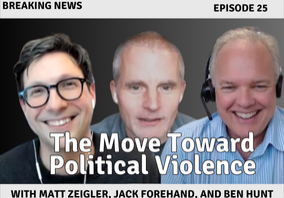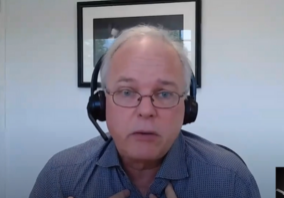Sir Steven Wilkinson is the founder and CEO of Good & Prosper, an investment firm and knowledge platform for entrepreneurs and small & medium-sized enterprise (SME) business owners, as well as a founding member of the Small Giants Community, a US-based organization that provides resources and a community to value-based leaders.
Sir Steven writes a weekly note on Substack, titled Pitchfork Papers, which you should definitely check out! As with all of our guest contributors, Sir Steven’s post may not represent the views of Epsilon Theory or Second Foundation Partners, and should not be construed as advice to purchase or sell any security.
“To live fully, one must be free from fear. And the only true freedom is the freedom of the mind.”
Tiziano Terzani ~ The End is My Beginning
My father is not very good at dying.
He has been trying apparently for about eighteen months now and has failed more times than my eldest daughter has failed her driving test. Which is saying something. Admittedly, Wicklow Town is a notoriously difficult place to pass a test and it appears that the Fylde Coast of Lancashire in the North West of England with its North Atlantic climate and annual rainfall on a level that only people who live in Seattle can probably appreciate is a difficult place to die.
Apparently.
My grandfather moved to the Fylde in North West of Lancashire from Derbyshire in the 1930s for health reasons I am told having suffered from a dicky heart along with some respiratory issues, for which the sea air provided relief. His heart did for him in 1976 at the tender age of 67. I only have vague memories of him, a tall stern Victorian man who built and ran a successful business, a tech entrepreneur of the 1950s and 1960s but with a perpetual tie and heavy tweed or twill suits and occasionally a monocle instead of the half-moon gold rimmed glasses that I remember him wearing. He also treated my father like a bag carrier and runner so I guess he must have been something of a tyrant.
His only son, my father, who followed in his footsteps in the business until he sold it in a friendly takeover in 1986, is two months away from his ninetieth birthday and his heart has passed it sell-by date by a couple of months now. He is in extra time and my mother has sounded the deep tone of the ram’s horn trumpet to gather the clan at the bedside of the dying chieftain about four times over the last one and a half years with an urgent summons to come and take our leave before it is too late. Which of course we, as dutiful children and grandchildren, did as soon as flights could be arranged, holidays cancelled or dog-sitters found to travel from our various homesteads hurrying back to the source for the emotional and often distressing task of holding hands with a weakening, shrunken bed-ridden figure who bore some passing resemblance to my father.
I saw him in hospital after he fell on Christmas Day last year breaking his hip and in urgent need of surgery, which the doctors told us was routine enough but given the condition of his heart severely reduced the odds of his surviving the operation. He was confused and frightened when my youngest daughter and I visited him in Blackpool Victoria Hospital, but fully aware that his chances of dying were high. His mind was already slipping and his incessant stream of consciousness bubbled up highly detailed memories of his days as an officer in the Blues cavalry regiment commanding his platoon in Aden in the late 1950s. There was an urgency around the telling of his stories of camel racing and exploding desert latrines as if he was in a rush to ensure that none of them would be forgotten. His grasp of detail from 70 years ago was extraordinary even though he had only a vague idea of where he was and even who we were and no recollection of what had occurred only ten minutes previously as is the way with those whose cognitive faculties are diminishing. Leaving the ward was heartbreaking. We both knew that when I came back the next day, he might not be there anymore and his eyes held a haunted look of endless sadness and loneliness which lingers with me still.
He survived that operation and when we came back to visit him the next day waiting hours and hours for him to re-emerge from the post-op recovery ward, we found the nurses laughing and keen to tell us the story of his awakening. Apparently when he regained consciousness the first thing his eyes focused on was the pretty ward nurse standing at his bedside.
“Am I in heaven?” he asked anxiously to which she replied “I bloody well hope not – this is Blackpool. You’re still here.”
I don’t know whether he took that as good or bad news and the morphine induced delirium made any conversation with him impossible. I certainly know what was front and centre of his mind when they wheeled him into the operating theatre and began to anaesthetize him that morning.
We came back in the summer when the ram’s horn had been sounded for a third time after another hospital visit and again two weeks ago when, now in a care home, his condition appeared to have worsened enough for the alarm to have been sounded once more.
When I arrived I found him even smaller and more shrivelled than previously but lucid. By lucid I don’t mean ‘able to conduct a conversation’, but – and this is why I have such trouble assigning every old person who is no longer functioning at anything like full mental capacity with the label dementia – everything he did say made sense and represented a truth of sorts if you could figure out the context. The mental muscles of his mind are weak, no doubt and sometimes he can’t hold on to a thought from the beginning to the end of the sentence, which to borrow a phrase from my favourite poem “makes for difficulties”, but they are truths nonetheless and represent the residual core thoughts and concepts that are emerging unfiltered and often unsorted without the wardens of convention, ego, fear or whatever else keeps us from speaking our truths forcing them back down deep inside. In these days of mental weakness the mind cleans out what has been repressed or what has always been in there but rarely aired. In my father’s case the worry and fear that seemed to define his experience of the world informed nearly every kernel that emerged from him. That plus regret.
He is confined to a bed with a safety railing around it to stop him falling out or, given his pigheadedness, attempting to get out himself.
“You have to help me, Steven.” he whispered conspiratorily with a furtive glance to the door in case one of the nurse carers might be listening.
“If I can I will, Dad” I replied, dropping my voice to a stage whisper because he is deaf. So it was more like a shout whisper, which is a very difficult thing to perform with a straight face.
“I need you to help me get my independence” he said, deadly earnest.
I promised I would, of course.
In the conversation that followed he pointed out that whilst my mother and sister were able to move around and go where they wanted, go shopping and visit friends, he was stuck here in bed. The answer, he decided, was that he needed a car.
“Of course. What sort of car do you want, Dad?”
“One like you had.”
“You mean an MG Roadster?”
He beamed for a moment and nodded.
“We can drive to Knott End and have lunch at The Stork”
The Stork used to be a lovely pub on the far side of the River Wyre on whose upper banks my parents have lived for almost all their married lives, their property having previously been my grandfather’s land and whose fields and woods rolled down to greasy grey slick mud banks of the river, some two or three miles down river from the estuary where it merges with the Irish Sea. I don’t like it much and have never really felt at home there, but I will admit that there are vistas and corners of river banks and marshy fields with a big grey sky above them to which I feel a connection that is authentic, deep and instinctive.
I cannot remember my father ever having suggested that he and I do anything together spontaneously, especially nothing so frivolous as spin in a sports car to a local pub for a pint or a lunch together, just the two of us. Never. But he was excited to do just that as part of his bid for independence and autonomy at a time when he is never going to get into a car again in his life, nor visit a pub, long after the MG has left our lives and possibly even with The Stork at Conder Green no longer in existance (actually it is – I just checked). Which made it all the more poignant. I may be imagining this, and it may tell you more about me than him, but I couldn’t help but feel that he would really have wanted to be more spontaneous, to have done things with us, with me and that the fact that that was where his mind took him, sitting with me fully aware of who I was, gave me both some wry comfort and filled me with sadness.
“You’re not very good at this dying lark.” I said to him.
“What?”
“I said, you’re not very good at this dying business – this the fourth time you’ve tried as far as I can tell and you’re still here. You are obviously not very good at it.”
There was a moment of silence in which he closed his eyes and rested his head on the pillow.
“No.” he said. “I’m still practicing.”
The nurse came in to ask him what he wanted to eat for his lunch and as he was drifting in and out of sleep, we talked over him.
“He’s a lovely man, your father.”
“He is.” I agreed “Mostly.”
“He must have had a good sense of humour. I can tell the way he jokes about things sometimes. But he is a worrier.”
“You mean worrier with an ‘o’ not an ‘a’”
She laughed. “Yes, he worries all the time.”
I told her that both things were true. He worried incessantly, all the time about everything for as long as I could remember and would explode in rage when things appeared to move out of his control, rage I now know was panic. And whilst he used to have a wicked sense of humour according to the friends who had known him all his life, worry had eaten it away so that at the end there was almost none of it left. Occasionally remnants of it would seep through and now in his gloaming hours, they flickered like fireflies through the worry, regret and fear.
His mind although relaxing its grip on consciousness was a formidable instrument until quite recently. I suspect he was one of the most gifted mathematicians of his generation and I remember vividly him reading books on advanced mathematical principles whilst I was buried in Charles Dickens or Wilbur Smith as a child, intrigued that anyone would chose to spend their time poring over pages and pages of formulas and taking notes of calculations. Others who could judge his quality as a mathematician attested eagerly to his genius. He was an expert navigator as well although a nightmare to be on a ship with as his child. But he could shoot the sun with his sextant at noon and use his little book of log tables carefully wrapped in a plastic sheet secured with the ubiquitous rubber band – the invention I suspect he revered most in pantheon of human technical achievements – to protect it from the weather onboard to calculate precisely where we were on the planet to within a few yards.
If he ever does die it would be a fitting tribute to put a large rubber band around the coffin. I feel he would appreciate it.
The End is My Beginning
On my return to Ireland from Lancashire, I went straight to my copy of the Italian journalist Tiziano Terzani’s last book “The End is My Beginning” (La fine è il mio inizio”), co-authored with his son Folco and published, as it was always intended to be, posthumously in 2006.
Terzani, born in Florence in 1954 was a prolific journalist, social commentator and peripatetic writer who spent most of his life wandering through Asia and reporting primarily for the German weekly magazine Der Spiegel. His magnificent books “A Fortuneteller Told Me” and “One More Ride on the Merry-Go-Round” are masterpieces of journalistic essay writing, but his final work is probably his most poignant and philosophical. Suffering from a terminal stomach cancer which he refused to have treated with the usual Western chemotherapy and radiation method, which he sees and an abomination, he writes to his son Folco in New York and invites him to come home “while there is still time” and spend a few hours a day talking to him about his life and times and to ask of him any questions which as his son he might wish to ask him. He explains that he never got to ask his own father any questions about his life and felt that this would be a worthwhile project for them both. Folco agrees and returns home to the hillside house to which his father has retired and fully intends to die. Folco brings recording equipment (he is a journalist himself) and captures the conversations which, after his father’s death later that year end up as the book “The End is My Beginning” in 2006 and a film with Bruno Ganz in the role of Terzani in 2010.
Terzani’s reflections on his journey through life are reminiscent of Eliot’s phrase in Little Gidding in which he states that
We shall not cease from exploration
And the end of all our exploring
Will be to arrive where we started
And know the place for the first time.
Through the unknown, unremembered gate
When the last of earth left to discover
Is that which was the beginning;
At the source of the longest river
The voice of the hidden waterfall
And the children in the apple-treeNot known, because not looked for
T.S. Eliot “Little Gidding (V)
But heard, half-heard, in the stillness
Between two waves of the sea.
Terzani draws his wanderings through life and in particular through Asia together in a philosophy of transcendental simplicity whose essence he seeks to impart to his son. He encourages him (and us) to embrace the reality of death and the perspective it gifts us on life, choosing its inevitability as a reason to embrace it and use the remaining time to seek deeper meaning and understanding of life. Above all he recognizes the necessity of understanding how every aspect of life and matter is connected and that our western lives appear designed deliberately to obfuscate and deny that simple reality.
“Ora credo che l’universo abbia un ordine nascosto, e sono convinto che anche nell’apparente caos del mondo, le cose siano collegate.”
“I now believe that the universe has a hidden order, and I am convinced that even in the apparent chaos of the world, things are connected.”
Tiziano Terzani – The End is My Beginning.
And he adjoins us, as Jesus did, to stop worrying:
“To live fully, one must be free from fear. And the only true freedom is the freedom of the mind.”
Tiziano Terzani ~ The End is My Beginning
“Which of you by taking thought can add one cubit to his stature?”
Matthew 6, 27
It is beautiful, poignant and inspirational and I cannot recommend it enough as a prompt to either interview your own father or if that is too late to invite your own children if you have them to do the same before they or you lose the capacity to remember and articulate. Once it is gone, it is gone.
My father and I have missed the opportunity in this life to have that conversation about his journey – I will have to make do with piecing together the fragments that I was able to see to create my own version of it and to examine what it was I was to learn from the often difficult and fraught relationship we had and make time and space for that invitation to my own children. The goal has to be that when we are no longer able to articulate anything other than a stream of unfiltered consciousness that what comes out of our mouths and from the depths of our hearts should be joy, goodwill and peace, not worry, regret and fear. When I go out mumbling the incoherent snippets from my innermost recesses, I want them to be mumblings of joy and gratitude and deep love along with the occasional awful joke, which I suspect will be the last of my faculties to be switched off.













I thought this was a tremendous note. Possibly also the funniest writing I’ve seen on ET or elsewhere in quite a while! Thanks for sharing the story, Steven.